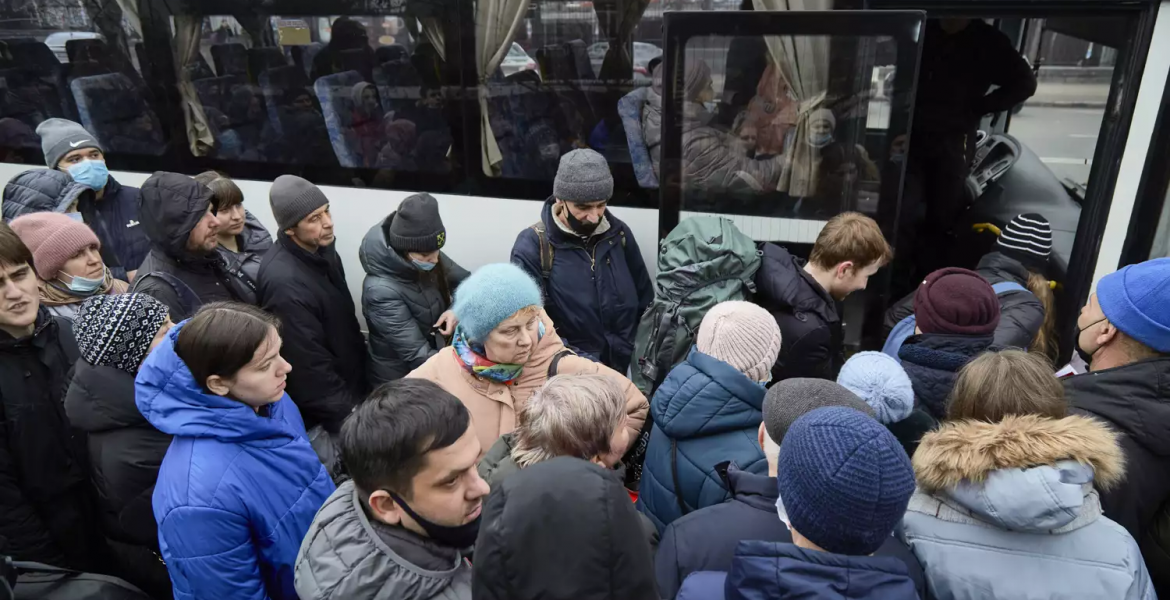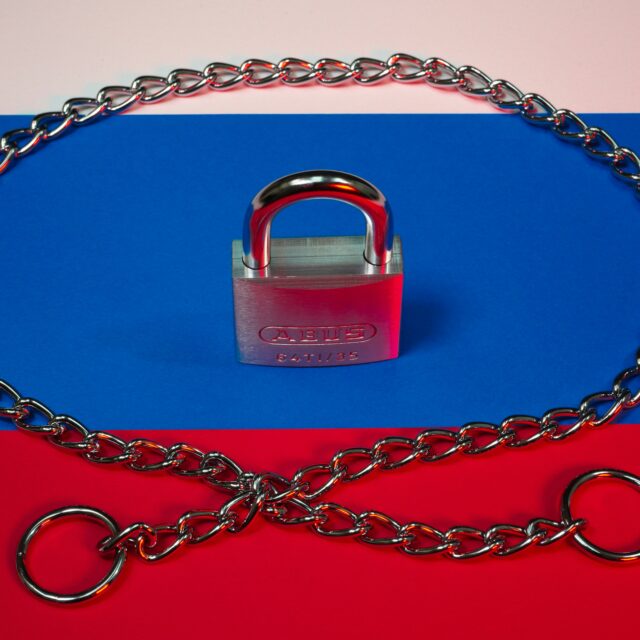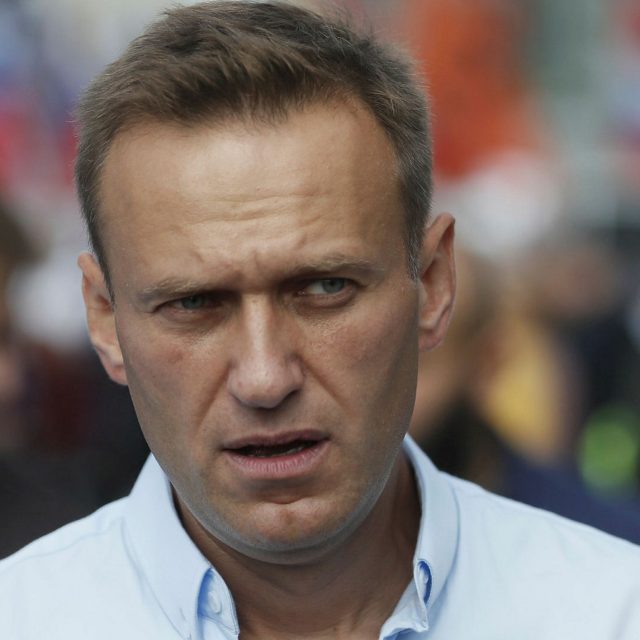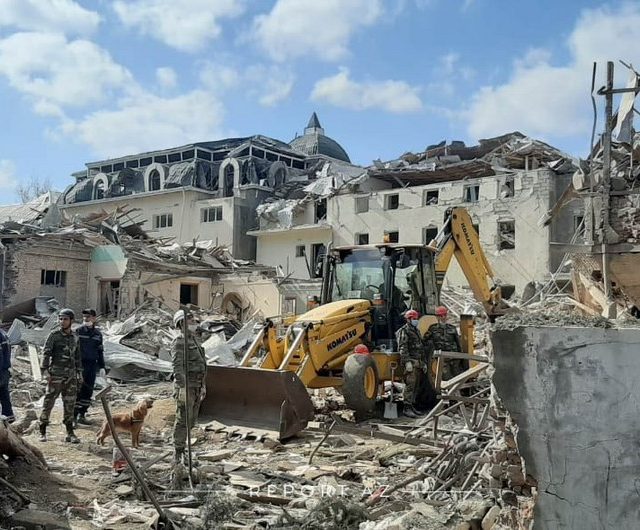After the Russian invasion of Ukraine on 24 February, the Russian invading army has continuously violated the basic norms and principles of international and humanitarian law, including the general provisions of the Geneva Convention on the Protection of Civilian Persons in Time of War, writes Bogdana Bondarenko
According to the Convention, its application is envisaged in all cases of declared war or any other armed conflict that may arise between two or more parties, even if one of them does not recognise the state of war. The Convention also applies to all cases of partial or total occupation of a party, even if that occupation is not met with any armed resistance.
This document was ratified by both states, and therefore had to be implemented. Unfortunately, today from the Russian Federation, we see only examples of contempt for the international community and Ukraine, and global non-compliance with the commitments: bombing of hospitals, harsh treatment of prisoners of war and civilians.
According to the latest official data, confirmed by the Ukrainian authorities, more than 1 500 Ukrainian civilians are in Russian captivity. This was reported by Iryna Vereshchuk, the Deputy Prime Minister and Minister of Reintegration of the Temporarily Occupied Territories, during a briefing at the Ukraine-Ukrinform Media Centre.
She noted that among the Ukrainian civilians who are in captivity are public activists, volunteers, priests, journalists, deputies of local councils and heads of local self-government bodies, etc.
One of the 25 recently released volunteer-drivers Yevhen Maliarchuk, who was carrying humanitarian aid from Zaporizhzhia to Mariupol, was detained for more than 3 months in the territory of a former correctional colony in an occupied territory of Donetsk region, agreed to give an interview to EU Political Report.
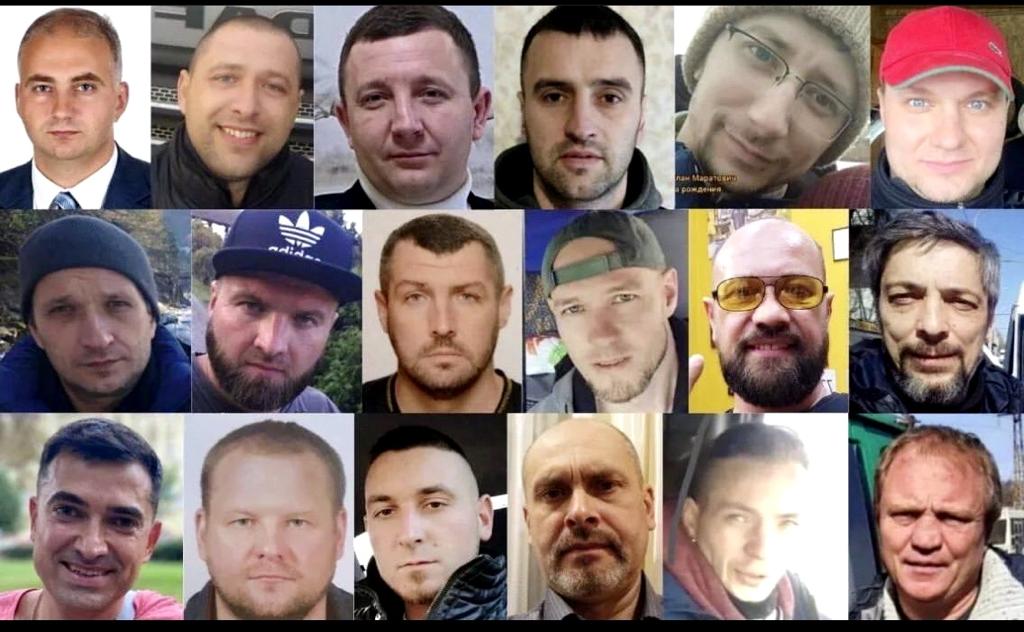
Yevhen is a young private entrepreneur. Before the war he owned a small construction business. He was born in the city of Mariupol, Donetsk region, but at the time of the beginning of the Russian invasion, he had already lived in Kyiv for a long time.
On the first day of Russia’s invasion of Ukraine, Yevhen started calling his loved ones in Mariupol: parents, relatives, friends, colleagues. Only a few managed to leave the city. Mobile communication was the first to disappear in Mariupol, fierce battles began, and the humanitarian disaster was growing. At that time, his parents could no longer leave the city, like many other residents of Mariupol.
Yevhen immediately made a decision to evacuate his relatives and provide assistance to all who needed it. On 3 March, all entrances and exits to Mariupol were closed, it was impossible to reach the city by transport or on foot, and the railway connection was no longer working. So he quickly got to Dnipro, where he had to stay for several weeks to plan his route to the city and wait for his mother to contact him.
“It happened very rarely, once every 7-10 days. At that time, my mother changed her place of residence three times. The house in which they lived was badly damaged by shelling. The roof was destroyed and the windows were broken. In the last phone call, I could already hear the despair in her voice. There was no electricity, water and gas in the city. They had to sleep in jackets. It was very cold, -10 degrees. To talk to me she needed to leave the house, and there were many corpses lying on the streets near the house…”
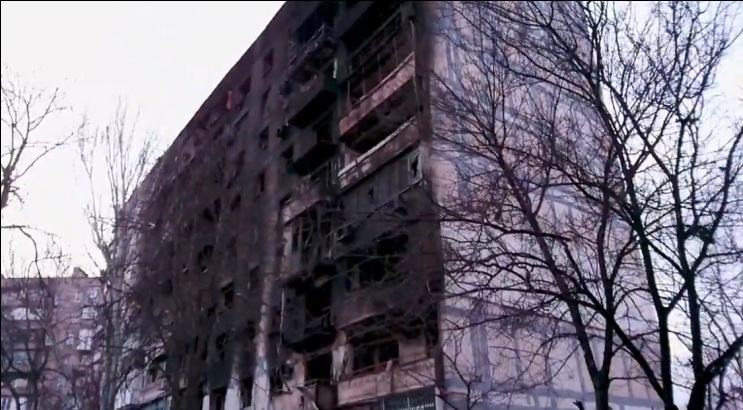
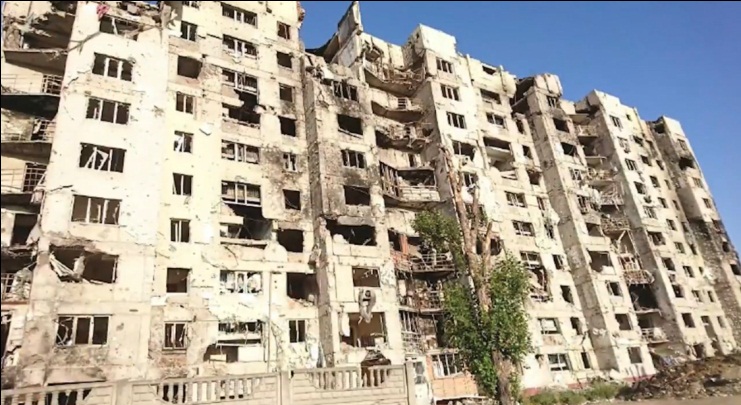
Hearing all this, Yevhen decided to go to Mariupol immediately by any possible means. At that time, he had already heard about volunteers who managed to enter the city. Thanks to them, he found out that it was impossible to get to Mariupol by car. He bought a minibus, loaded it with humanitarian aid and agreed with volunteers about the opportunity to join their convoy. The departure was planned for 26 March from Zaporizhzhia, but he did not have time to join them on that day due to the difficult and long passage through checkpoints. The convoy coordinators warned Yevhen that it would be better to wait until Monday and only then leave to Mariupol together. At that time, a several-day curfew was established in Zaporizhzhia from 26 March to Monday. Therefore, not being able to lose so much time, Yevhen left on 27 March, agreeing on the route with the volunteers.
According to Yevhen, the problems that led to his capture began in the morning of that day. In the city through which the road ran, and which was already under Russian occupation, there was a complete lack of mobile communication. The volunteers recommended to wait until the signal appeared and only then leave, because the road was extremely dangerous. But Yevhen could not postpone the trip. He agreed his departure with the coordinators and agreed to contact them immediately when a mobile signal appeared. Unfortunately, the connection did not appear that day.
When he entered Mariupol, he was stopped at the first checkpoint by the occupying military and sent to the local commandant’s office of the DPR. Yevhen says that he was checked for a long time and thoroughly. After checking, he tried to find out how to get to the Ilichev district, the place where his parents lived. The Russian servicemen replied that it was dangerous and almost impossible to go there – there were ground battles.
There was still no connection, so he had no choice but to go to his relatives’ address, hoping to find them there. So it happened, he saw his family: all the family members were alive and cooking food near the house on the fire. They refused to leave the city, arguing that they could not leave the house – it would be robbed by marauders. All the more, as the relatives said they were ready for such a scenario: in 2014, the invaders tried to capture Mariupol, but Ukrainian troops repelled the attack and returned the city under their control.
Yevhen found out that he had separated from his mother for only one day. At that moment, she had already left Mariupol and was heading to a safer Ukrainian city with a group of people. Yevhen continued his attempt to evacuate other residents. There was a lot of information on Social Media about an 11-year-old boy who was left an orphan due to Russia’s armed aggression. As far as was known, he was located somewhere in the center of the city. So, first of all, Yevhen went there.
Passing checkpoints, he asked DPR military how far he could drive and where exactly the battles were taking place. But he came to the conclusion that they answered extremely reluctantly and did not have the information.
“To put it mildly, they were uneducated people, completely illiterate, lacking any professionalism. This is what I constantly encountered in this “miracle republic”. No one told me anything, none of them knew anything. They only answered: “if you hear shooting – stop.”
Yevhen crossed the tram track and found himself in the centre of the city. It was only possible to get further on foot.
“It was like a scene from a horror movie. Fallen trees and pillars, tanks flew past me at breakneck speed, muffled explosions were heard, and the city was completely destroyed. I went to the area where this guy was supposed to live. For me, it was a shock, complete devastation. And somewhere after 200 – 300 metres from me, heavy fighting began. Those were automatic queues, shooting. I saw military running across the road and shooting back. I was scared and froze, probably snipers were everywhere around me.”
At this time, the firefight on the streets did not stop, but only intensified. He quickly “dived” into the yards that were on the way to the location of the 11-year-old boy. It was there that Yevhen met the first residents. Passing by them, he explained that he intended to pick up everyone who wanted to leave the city, and where exactly he had parked his car. In the basement of one of the houses, an older man informed him that the boy he was looking for had been evacuated yesterday.
From that basement he took two elderly women, one of whom had difficulty moving: she could only walk on level ground, and all the streets were heavily damaged by shells. When they got to the car, a lot of people were already waiting for them. There were 22 of them in total. They set off and already on the way out of the city they were stopped by a car with the letter “z”. The representatives of the republic met them rudely, Yevhen was ordered to go through another document check, and then they forced him to leave the people near the school, which, according to them, wasa humanitarian centre of the DPR.
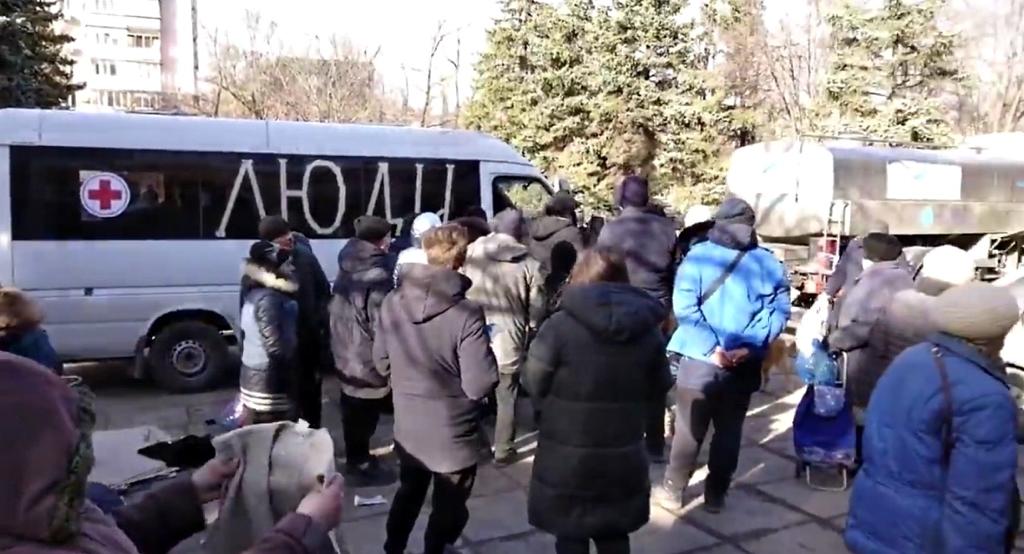
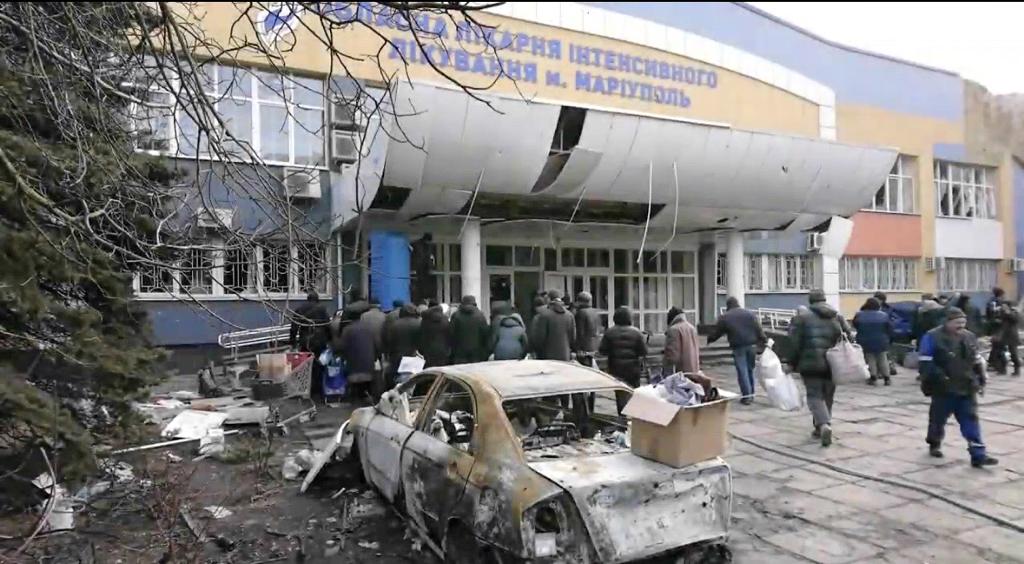
Yevhen was taken to the district police station, where another commandant’s office was located. The invaders took fingerprints, took a photo, interrogated, took away all personal belongings and car keys. Then a representative of the DPR came to the office and said: “What are you talking about with them? Send everyone to Starobeshevo. Let them talk there». Yevhen tried in vain to explain to them that he was a simple volunteer.
On that day, Yevhen was first placed in a small cell, in which there were already more than 20 people. But that was only the beginning.
“The military began to name our names. I thought that the problem was solved and I would be released soon. They called my last name, asked me to check my bag, there was no money in it. They put a label on the bag, asked me to fold my hands behind my back, and they twisted me. They put me on a bus, and there were already a lot of people inside. Everyone was told to lower their heads, put on their hoods and not move. And they began to rudely threaten us, explaining what would happen to us if we disobeyed. We were taken in an unknown direction. I kept hoping that they would frighten us and let us go. But at the next checkpoint, when the door opened, a military man came in and asked: “Who are you taking?” The guards answered: “prisoners of war.” Here I lost the gift of speech.
They were brought to Starobeshevo, a village that has been under the occupation of the self-proclaimed republic since 2014. Not allowing them to raise their eyes, the civilians were taken to the building, broken down again, and taken to the basement in this position.
“Many screams were heard. We were beaten selectively. We were all searched. They put on the so-called “cartachi”, I didn’t even know such a word before that. This is a very uncomfortable position. You’re on your knees, hands behind your back and you can’t move. It was also forbidden to sit down. Everyone who sat down was beaten.”
Yevhen and other 26 people were placed in the basement, in a prison cell 5 by 5. The room was very cold, there were no beds and mattresses. Jackets served them as pillows, mattresses and blankets for a long time. He was fed extremely poorly: 1 piece of bread or 1 package of instant noodles, which he divided into 4 meals.
Once, the military again entered their cell with a check. The prisoners gave their names, then they put on hoods, wrapped their eyes and hands with tape, put them in a truck and took them away in an unknown place.
“The first question I heard was: “Who are you?” I gave my first and last name. The soldier asked again, raising his voice to me. I answered again, explaining that I was not in the military, that I was a volunteer who wanted to evacuate the family. After that, I received several strong blows. Someone pushed me away. I already thought to myself that this is the end for me. This man rather rudely explained to me that my task was not to speak, but only to answer the questions. That no one was interested in my opinion, and I was nobody and nothing here. If they kill me here, no one will ever know. So I had to answer “civilian” to the question. Later, when we were asked about who we are, if you managed to shout “civilian” – you weren’t beaten, others could be hit several times. In general, the attitude towards us was very cruel, inhuman. The authorities did not care who you were: “civilian” or “military…”
Upon arrival at the new pre-trial detention center, they sat for more than an hour with their eyes and hands blindfolded. They were interrogated again, checked for fingerprints. According to Yevhen, during all this time, the only reasonable person from the occupiers talked to him: he listened to Yevhen, did not threaten or raise his voice, and at the end he said that there was no “corpus delicti” and that he would be released tomorrow. On this day, for the first time Yevhen fell asleep calmly, knowing that tomorrow he would already be free.
Yevhen spent the whole next day waiting, but the release never happened. By evening, Yevhen and five other men were put in a car and brought to another detention center. Leaving them there for one day, the next morning he was taken out of the building to the street and taken to a paddy wagon, which already had 30 people, but it could only accommodate 10. Many became ill, some fainted. It was not an easy road to Olenivka, the place where Yevhen spent more than 3 months in captivity.
Yevhen says that it was the most difficult there. They were taken into the building and forced to take the “star” position, in which they were forced to stand for several hours. They were stripped naked, each had to sit down three times during the examination by a medical worker. As it turned out later, this female doctor was one of the prisoners of war of the Armed Forces of Ukraine.
After passing the inspection, there were already 29 of them, they did not count one man – where he disappeared, no one ever found out. Yevhen got into cell number 16, at that time there were 36 people in it, and several times their maximum number reached 44, although the cell itself could accommodate only 6 people.
The cell was empty: no mattresses, no blankets. There was absolutely not enough space, 7-8 people were constantly standing, because it was possible to sleep only in turn. The light did not turn off even at night. The toilet was located in the room itself, there was no water, so it was clogged every day, and it was forbidden to use it almost all the time. There was not enough air in the room, the window was constantly closed. They were fed poorly – only water and bread were given. And the playground had an area of 15-20 squares and was completely fenced with a metal mesh. It was the territory of a disciplinary detention centre, the so-called “prison in a prison”. Yevhen noted that later, for a certain period of time, they were offered to improve their living conditions by moving to the barracks, on the condition that they would make repairs there at their own expense.
The month of their imprisonment was coming to an end, but instead of releasing the civilians, they were forced to sign a “continuation protocol”, and this happened to them twice without any explanation.
“To the question” why? nobody explained anything. No one answered. We were forced to sign the protocol, but we all noticed that it was written that we were allegedly released and detained again. Of course, we were upset, but then began to support each other and just wait…”
One day, the flag of the Russian Federation was raised over the prison, and a huge number of Russian soldiers appeared. As it became known later, this was the day when military from “Azovstal” began to be brought to the prison. In general, as Yevhen says, there was a completely different attitude towards prisoners of war.
“All military who were sent to prison were subjected to torture, they were forced to sing the Russian national anthem. They were beaten for several days, among them were searched for soldiers from the “Azov” battalion, and therefore they were treated much more cruelly than we were. I constantly heard how the military was being beaten. The sounds were very frightening. As I heard, there was even 1 fatal case: after two days of interrogations and beatings, one of the Azov prisoners of war allegedly cut his veins, they did not save him. As far as I know, there was an order not “to touch Azov”, but I don’t even want to imagine what could be done with them. They were charged with the execution of criminal orders, cases were opened against them, and they were interrogated a lot. Communicating with them, I met among them many of my acquaintances from Mariupol, with whom I spent my childhood together. They told about the month under the bombardment of Azovstal and other terrible stories. They did not start exchanging them right away…”
According to his words, before the people from “Azov”, there were more than 2,000 people in the prison, despite the fact that the prison zone was meant to accommodate 1,200. It was very difficult, there was not enough food for everyone. Later, many of them would be suddenly sent to prisons in Donetsk, hanging criminal cases on them. The total number decreased to 400 people, and all the others were newly arrived Azov soldiers – some 2,000.
In the third month of his stay in captivity, the hope of release became less and less. Yevhen and the others were transferred to an area of increased control: the entire territory was fenced off, even the sky was in a cell. There were 22 men in one small cell and they spent all their time in it. They were lucky enough to go for a walk in the courtyard only twice.
Around 4 July, as Yevhen says, information appeared that from Monday civilians would begin to be released, but in very small groups.
“When they came to our cell, there were 19 of us, they started naming us: 1, 2, 3…12, 13th surname. The surnames were in alphabetical order, but mine was not called. My heart was pounding so hard, I was very worried. My name was the last – 19th. The feeling could not be expressed in words. After being released from prison, I received a certificate of filtering. They called it filtration – not capture. As I found out later, someone was released and issued a filtration certificate after a few days, I spent there 100…”
After leaving the prison building, Yevhen was so hungry that the first thing he did was buy food – his clothes were hanging on him, he lost 15 kilograms. And he called his relatives.
“These were tears of happiness. During the entire period, none of us was given the opportunity to call our loved ones. There were a few cases, but it was more of an exception to the rule. We tried to convey the news to relatives through those who were released from prison. We tried to inform them by all available methods. I did not know whether the news about me reached my relatives or not. I could barely calm my mother down when I called her the first time. It cannot be expressed in words.”
He noted that none of his relatives, after his release, told him that they thought they would never see him again, but he heard such notes in the voices of people close to him. When Yevhen turned on his mobile phone, he saw more than two thousand text messages in different “apps”. Everyone sympathised, worried, everyone sincerely tried to help him.
“I know that when we disappeared, our relatives actively tried to find us, spread information about us through all possible means. The relatives of all the prisoners united and appealed to our government and to the governments of other countries. After the first month without answers, they started to get discouraged, but that’s probably normal. But they did not give up and went to the end. The work was incredible, I am sincerely grateful to them, we are all very grateful to them for our liberation.”
So far, according to Iryna Vereshchuk, a little more than 100 captured civilians have been returned. The Ukrainian authorities continue to work on this task. But only on the territory of the recently occupied Kherson region, the kidnapping or disappearance of 408 people has been recorded. This information was reported by the chief information policy specialist of the Kherson Regional Prosecutor’s Office, Anna Chernyavska. The Deputy Prime Minister – the Minister for Reintegration of the Temporarily Occupied Territories said that Russian occupying military forces confirmed information about only 120 people.
Russia disregards all international agreements and human rights. So what could be the real number of civilians in Russian captivity? It is practically impossible to gather such information in places of active hostilities and in occupied territories.
At the time of writing this article, one of the buildings on the territory of the correctional colony in Olenivka, in which Yevhen and other Ukrainian citizens were in captivity, was totally destroyed with thermobaric weapons by the Russian Army Prisoners of war, defenders of Mariupol, were kept there. At least 53 people died and 130 were injured. Sincere condolences to the families of the fallen soldiers.
The Author, Bogdana Bondarenko, is a special correspondent for EU Political Report, based in Ukraine.

